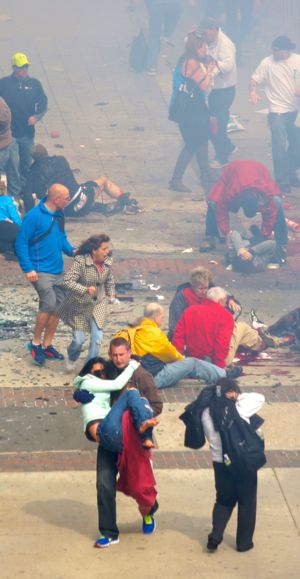Global fears: And now? An enemy within?

Cambridge, Mass., photographer Aaron Tang captured this image as smoke still hung in the air after the Boston Marathon bombing. He released the photos into the public domain via Wikipedia to help clarify what had happened.
And now?
I began reporting and writing this week’s series on global fears on Sunday afternoon, thinking that we would discuss widespread anxiety about “enemies” in distant lands. I wrapped up the first two columns on Korea and then on Iran before I found myself, like all Americans, coming to terms with the aftermath of the bombings in Boston.
Monday dawned as Patriots’ Day, a holiday celebrated in Massachusetts and Maine. The weather was great. The Boston Marathon was well attended. Then came the wanton act of killing and maiming innocent people.
Two bombs exploded near the finish line of the Boston Marathon, placed and timed to inflict maximum damage. Labeled an act of terrorism, it is unknown at this time who planted the bombs or why. The bombings could have been conducted by homegrown terrorists, by foreign terrorists operating on American soil, or even by a lone operator.
This week is the anniversary of past shootings and acts of homegrown terrorism, such as the Oklahoma City bombing, the killings at Columbine High School, and the shootings at Virginia Tech.
After Monday’s bombing, law enforcement officials are crowd sourcing part of their investigation—asking anyone who took photos or videos at the Boston Marathon to come forward and submit them. Early yesterday, Google set up a Boston Marathon people finder page, where a user could post a query (“I’m looking for someone”) or report information (“I have information about someone”). Meanwhile, others hurried to document unfolding details of the case on Wikipedia—and you may be surprised at the depth of the coverage already assembled (including Aaron Tang’s photos).
Tomorrow, President Obama will participate in a memorial service for the victims in Boston.
National security is a core American value, according to my national surveys. More than 87 percent of Americans agree that the protection of the United States from both internal and external threats is a major concern for them. This week, the percentage must be close to 100 percent.
Are internal threats a major concern for you?
Do Monday’s horrific attacks mean that we should be much more vigilant at home?
Are external or internal threats more worrisome?
Wayne Baker is a sociologist on the faculty of the University of Michigan Ross School of Business. Baker blogs daily at Our Values and can be reached at ourvaluesproject@gmail.com or on Facebook.

